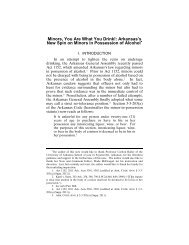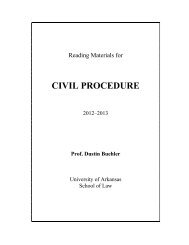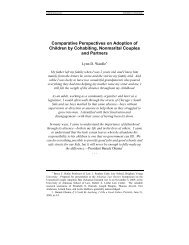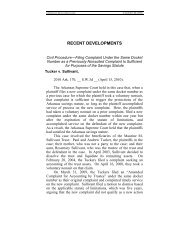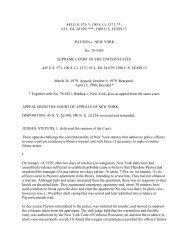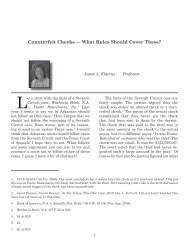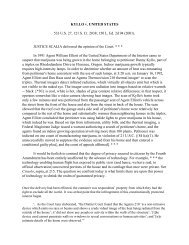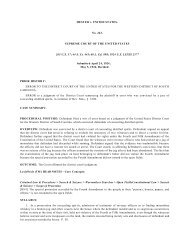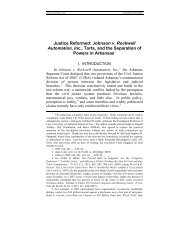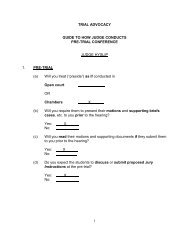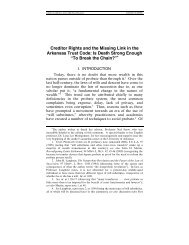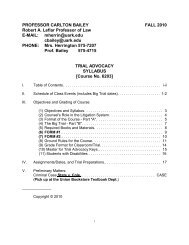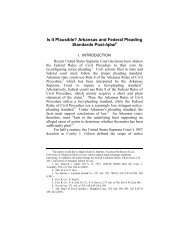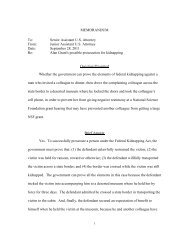Facebook Discovery and the Unbearable Sameness of Internet Law
Facebook Discovery and the Unbearable Sameness of Internet Law
Facebook Discovery and the Unbearable Sameness of Internet Law
Create successful ePaper yourself
Turn your PDF publications into a flip-book with our unique Google optimized e-Paper software.
58 ARKANSAS LAW REVIEW [Vol. 65:39<br />
material.” 78 The Zimmerman court granted <strong>the</strong> defendant’s<br />
request, but expressed concern that its decision not be read as<br />
giving opposing counsel in every case “carte blanche entitlement<br />
to <strong>Facebook</strong> <strong>and</strong> MySpace passwords, user names <strong>and</strong> log in<br />
names as part <strong>of</strong> a discovery request . . . .” 79 The court <strong>the</strong>refore<br />
tried to limit its holding with a requirement <strong>of</strong> a “threshold<br />
showing that <strong>the</strong> publicly accessible portions <strong>of</strong> any social<br />
networking site contain information that would suggest that<br />
fur<strong>the</strong>r relevant postings are likely to be found by access to <strong>the</strong><br />
non-public portions.” 80 This reasoning suggests that it is quite<br />
possible that some <strong>of</strong> <strong>the</strong> courts that have refused to grant access<br />
to social-networking sites could be persuaded to do so if <strong>the</strong><br />
defendant is able to articulate a specific basis for believing that<br />
relevant materials existed in <strong>the</strong> account. 81<br />
That would be a mistake, however. Not only is a showing<br />
<strong>of</strong> potentially relevant information unnecessary in order to<br />
obtain such information in discovery, but it is also insufficient in<br />
justifying <strong>the</strong> remedy that some courts have been ordering:<br />
complete access by an opposing party to <strong>the</strong> subscriber’s<br />
account. A party has <strong>the</strong> right to receive in discovery only<br />
relevant, nonprivileged materials that it would not be unduly<br />
burdensome to produce. 82 The party’s ability to make a<br />
preliminary showing that such materials are likely to exist in a<br />
particular location cannot exp<strong>and</strong> <strong>the</strong> scope <strong>of</strong> discovery to<br />
include irrelevant or unduly burdensome materials. Nor does it<br />
permit parties to gain unfettered access to an opposing party’s<br />
files or communications.<br />
B. The <strong>Law</strong><br />
The orders granting access to a party’s social-networkingsite<br />
accounts have two significant problems. First, <strong>the</strong>y are<br />
entirely inconsistent with <strong>the</strong> rules <strong>of</strong> civil procedure. Second,<br />
<strong>the</strong> orders unquestionably invade users’ privacy without<br />
sufficient cause. Indeed, <strong>the</strong>re is some reason for thinking that<br />
78. Id.<br />
79. Id.<br />
80. Id.<br />
81. See supra notes 50-51.<br />
82. By “unduly burdensome,” I mean to refer to all <strong>of</strong> <strong>the</strong> restrictions set forth in<br />
Rule 26(b)(2) <strong>and</strong> (c)(1) <strong>of</strong> <strong>the</strong> Federal Rules <strong>of</strong> Civil Procedure.



